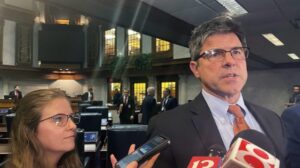Congress
The Federalist Society isn’t going anywhere
President Donald Trump said the Federalist Society gave him “bad advice” on judicial nominations. He’s still appointing their members to the federal bench anyway.
On Wednesday, the Senate Judiciary Committee will consider nominees for seats on the federal bench, including Emil Bove, Trump’s No. 3 at the Justice Department and an outsider to some mainstream conservative legal circles. Bove’s nomination has divided the right over whether Trump was eschewing the traditional conservative Federalist Society pipeline in favor of his own brand of loyalist nominees. But even amid a schism between Trump and the Federalist Society, the president’s orbit has continued to embrace lawyers and jurists who have ties to the most influential conservative legal group.
In a sign of the continued alignment between the Federalist Society and the administration, the Senate Judiciary Committee will also vote Thursday on a different slate of judicial nominees, all five of whom are members of the Federalist Society, according to their disclosures and the Federalist Society website.
“The Federalist Society is just interwoven into the conservative legal establishment,” said Russell Wheeler, a nonresident senior fellow at the Brookings Institution who studies the judiciary. For all Trump’s indignation, the majority of his picks thus far are “not only Federalist Society members, they’re proud Federalist Society members,” Wheeler said.
The Federalist Society is an influential conservative legal group whose ranks have included some of the nation’s most powerful judges, and its chapters on law school campuses have operated as a training ground for future conservative jurists. In Trump’s first term, the organization’s former Executive Vice President Leonard Leo served as a key adviser to the president on judicial nominations. The White House ultimately nominated and confirmed hundreds of judges to the federal bench, including three Supreme Court justices.
As some of the judges Trump nominated have ruled in ways he doesn’t like — and in particular in the wake of a ruling from the U.S. Court of International Trade that nullified Trump’s tariffs — the president announced in a post on Truth Social that he had cut ties with Leo. He called his onetime adviser on Supreme Court nominees a “sleazebag” and lamented his disappointment in the Federalist Society for the people the organization had recommended.
But it does not appear Republican Senators on the Judiciary Committee — even some of the president’s staunchest allies — share Trump’s new animosity towards the Federalist Society.
“We’ll go to people that I’ve always relied upon to give me advice,” said Sen. Lindsey Graham (R-S.C.), a current member and former chair of the committee. “The Federalist Society, I’ve known for a long time, I’ll still keep talking to [them].”
“I’m going to work with people that want to talk to me,” echoed Sen. Chuck Grassley (R-Iowa), chair of the committee. “Would we sit down and talk to them and have discussions with them? The answer is, we’ll talk to anybody.”
And others warn that most qualified candidates are still going to come from the group. “Unless they use Federalist Society association as something that actually stops someone from getting a nomination, I don’t think it’s going to make a difference, and if they did take that step, the talent pool would shrink dramatically,” said an individual familiar with the administration’s judicial selection process granted anonymity to speak candidly.
A White House official said in a statement that Trump relies on “his senior advisors, White House Counsel, and the Department of Justice” in the judicial selection process. “The mold by which President Trump chooses judges is that of Justices [Clarence] Thomas and [Samuel] Alito and the late Justice [Antonin] Scalia,” the official said. “Outside entities, including hometown senators, think tanks, and others, are always free to share their recommendations, but the President and his team will be the ultimate decision-makers.”
There has been a notable exception to the administration’s continued affinity for Federalist Society-approved lawyers. Bove, who if confirmed would hold a lifetime seat on the powerful Third Circuit Court of Appeals, has come under scrutiny for his controversial maneuvering to fulfill Trump’s political agenda at the Department of Justice. The president’s one-time criminal defense attorney, not a typical Federalist Society candidate for the federal bench, is facing allegations by a former lawyer at the Department of Justice that he suggested the administration should go against court orders. Some in the conservative legal sphere have questioned his nomination out of concern that he would unduly prioritize loyalty to the president.
Michael Fragoso, former chief counsel to Mitch McConnell, who as Senate Republican leader shepherded the hundreds of nominees that Trump confirmed in his first term, underscored that if the most qualified candidates were Federalist Society members, Trump would still choose them. “If you look at who’s being nominated by and large really, I think Emil [Bove]’s probably the only exception,” said Fragoso, adding that Trump’s second term judicial picks are for the most part, “pretty traditionalist Federalist Society people.” Fragoso is supporting Bove’s nomination.
Behind the scenes, the Federalist Society has continued to angle for influence, despite Trump’s frustration.
Mike Davis, an outside adviser to the White House on judicial nominations, said the Federalist Society’s new president, Sheldon Gilbert, reached out to him around the time he took over the organization in early 2025. Gilbert expressed that he wanted to mend fences with Trump’s orbit, and the two ate lunch together, Davis said. The Federalist Society did not respond to a request for comment.
“Having new leadership is an important step in the right direction, but the problem with [the Federalist Society is] they need to stop being the string orchestra on the Titanic,” said Davis, a former staffer to Grassley. “They want to look majestic as the ship is going down.”
In other words, the Federalist Society needs to supply lawyers who will contribute meaningfully to the president’s legal aims, Davis said.
Trent McCotter, a former Justice Department official and Federalist Society member who worked on judicial nominations during Trump’s first term, feels similarly. He said the number one priority for judicial nominees going forward should be a “proven track record of doing conservative work.”
“Membership in the Federalist Society is a signal, but it’s a relatively weak one,” McCotter said. “What you’ve been doing, putting your name on and filing, arguing in court for the last year or five years or 10 years, those are things that demonstrate much more what a person thinks about the law.”
“There will presumably still be nominees who are members of the Federalist Society,” he said. “It just won’t be the same kind of signal that it used to be.”
Tessa Berenson Rogers contributed to this report.
Congress
House GOP leaders race to release health care package Friday
House Republican leaders are rushing to release a new health care package Friday, but a morning meeting with members of key GOP faction led unsettled whether to allow a floor vote on extending expiring Obamacare tax credits.
Speaker Mike Johnson and other members of his leadership team want to file text of the health care legislation as soon as possible in order to comply with House notice requirements and prepare it to be take up by the House Rules Committee early next week. But the matter has been held up as they negotiate with conservative hard-liners who are wary of teeing up a vote to extend the expiring insurance subsidies.
“This is going to be a great piece of legislation that everyone will be united around,” Johnson told reporters after the meeting.
The core package is expected to include an expansion of health savings accounts and association health plans, as well as funding for cost-sharing reductions that help low-income Obamacare enrollees afford their plans. But moderate House Republicans want an amendment vote to add what is likely to be a two-year extension of the enhanced tax credits that were enacted by Democrats during the Covid pandemic and are set to expire on Dec. 31.
GOP leaders had been planning to let the subsidies expire, but they are now inclined to allow a floor amendment on an extension, according to four people granted anonymity to describe the closed-door Friday morning meeting with Johnson and a swath of senior Republicans.
Conservatives, including Budget Chair Jodey Arrington (R-Texas), have strongly objected to any attempt to continue the tax credits.
“I pity the Republican that has to explain why they would propagate or perpetuate, I should say, a fraud-ridden subsidy from the Covid era to prop up a failed health care program,” Arrington said Friday, saying it would make Republicans “complicit in propping up the very driver” of rising health care costs.
But he suggested a vote on an extension would happen regardless: “I expect people are going to have an opportunity to vote their conscience and then go defend their votes back home like we always do.”
House Majority Leader Steve Scalise said the topic was “heavily discussed” in the meeting, which another senior House Republican described as “lively.” Leaving the session, Scalise said leaders would be “making final decisions shortly, because we have to file text later today.”
Benjamin Guggenheim and Nicholas Wu contributed to this report.
Congress
Trump, Clinton, Gates included in Epstein photo trove
Photos from the estate of Jeffrey Epstein tie the late, convicted sex offender to President Donald Trump, former President Bill Clinton, tech billionaire Bill Gates and former Treasury Secretary Larry Summers.
These men and others are featured in the roughly 95,000 photos the House Oversight and Government Reform Committee has received from the Epstein estate as part of its ongoing investigation. House Democrats publicly released select 19 photos Friday morning.
“It is time to end this White House cover-up and bring justice to the survivors of Jeffrey Epstein and his powerful friends,” said the Oversight Committee’s top Democrat, Rep. Robert Garcia of California, in a statement. “These disturbing photos raise even more questions about Epstein and his relationships with some of the most powerful men in the world. We will not rest until the American people get the truth. The Department of Justice must release all the files, NOW.”
The White House and other individuals in the photographs beyond Trump did not immediately respond to requests for comment.
The Justice Department is required to release the full tranche of Epstein-related documents by Dec. 19, per the terms of legislation Congress passed last month.
Of the photos shared Friday, one features Trump alongside someone who appears to be a young woman (her face has been redacted). Another shows Trump standing beside Epstein, chatting with a woman, while a third has Trump grinning among a half dozen women whose faces have also been redacted. In that shot, he appears to have his arm around one women’s waist.
There is another photo in the tranche showing pictures of “Trump condoms” being sold for $4.50 each, branded with the words, “I’M HUUUUGE!”
There is a signed photo from Clinton depicting him smiling alongside Epstein and Epstein’s associate Ghislaine Maxwell, who is serving 20 years for her part in the sex trafficking scheme.
The images underscore Epstein’s long and storied network of connections to powerful men across industries, from filmmaker Woody Allen to conservative strategist Steve Bannon. They were sent to Capitol Hill after a subpoena from the Oversight panel for materials from the late financier’s estate, separate from the documents demanded from the Justice Department by legislation.
While Epstein’s connections with these public figures are far from new revelations, they highlight the extent to which Epstein reveled in his relationships with powerful people.
Gates, the Microsoft founder, is seen smiling at Andrew Mountbatten-Windsor, formerly known as Prince Andrew, in one photo and grinning beside a pilot in front of a plane in another. That photo has been published previously.
Summers, the former Treasury Secretary and president of Harvard University, is the latest public figure to face fallout from his relationship with Epstein. In wake of new materials produced in response to the congressional investigation, Summers was banned from the American Economic Association and stepped back from his roles at Harvard.
Summers is seen in one photo on what appears to be a small plane.
Bannon, who served as Trump’s chief strategist during his first term, is seen in the photos talking with Epstein at a desk and standing beside Epstein in front of a mirror, posing for a selfie. In another, Bannon appears to be speaking with Allen.
Trump has maintained that he ended his relationship with Epstein years ago and called the efforts clamoring for the release of the files a “hoax.” In a pivot last month, he gave congressional Republicans his nod of approval to vote to release the Epstein files and swiftly signed the legislation into law.
Those files are due in the coming days, after courts cleared the way for the Justice Department to release grand jury materials and the 30-day clock for Attorney General Pam Bondi to make the contents public is winding down. A Justice Department spokesperson did not immediately respond to a request for comment.
Clinton, meanwhile, has been subpoenaed by the Oversight panel, but a date has not yet been scheduled for his testimony to Congressional investigators. Trump has ordered Bondi to investigate Democrats with ties to Epstein, including Clinton and Summers. Bondi asked Jay Clayton, U.S. attorney in the Southern District of New York, to lead the charge.
Congress
Capitol agenda: Johnson stares down another revolt — this time on energy permitting
Speaker Mike Johnson is facing another intraparty revolt — one that has nothing to do with health care, defense policy or pay for college athletes.
Johnson wants the House to vote on a bill next week from Natural Resources Chair Bruce Westerman (R-Ark.) that would accelerate the production and delivery of domestic energy. For Republicans, it would fulfill a yearslong legislative priority — and for President Donald Trump, his dreams of achieving U.S. energy dominance.
But some conservatives want to speed up the federal permitting process only for fossil fuels. And they’re furious that Westerman’s measure, which advanced out of committee with bipartisan support last month, would ease the path for green energy projects, too.
The GOP will likely need to supply all the votes on a procedural rule — as per usual in the majoritarian House — to tee up the measure for floor debate. Right now, the votes may not be there.
“We’re taking in … whether [the legislation] goes far enough to free up all the constraints put on oil, gas and nuclear and whether it’s still promoting too much wind and solar,” said Rep. Chip Roy (R-Texas), who sits on House Rules.
The meltdown prompted Johnson to delay consideration of the bill from this week to next. But hard-liners have yet to budge, and Westerman told Blue Light News Thursday there are no plans to remove some of the most controversial language to appease them.
Freedom Caucus Chair Andy Harris (R-Md.) and Reps. Jeff Van Drew (R-N.J.) and Chris Smith (R-N.J.) escalated their campaign against the measure this week in a new letter to Trump and Interior Secretary Doug Burgum.
“Your administration would have fewer tools to rightfully halt offshore wind development, and projects currently being blocked by successful court actions brought by your administration would see a second life,” they warned of the consequences of Westerman’s bill becoming law.
Van Drew told Blue Light News he plans to share his concerns directly with the White House in the coming days.
For now, Johnson plans to plow ahead as GOP leadership aides work to resolve outstanding issues, three people close to negotiations told Blue Light News.
“We are working through it,” Westerman said in an interview. “We’re just taking everybody’s input under consideration right now and focusing on the big picture of getting permitting reform done.”
What else we’re watching:
— House moves on health care: Moderate House Republicans are talking with leadership about possibly setting up an amendment vote that could add an extension of expiring Obamacare subsidies to a health care package expected on the floor next week, according to four people granted anonymity to describe internal conversations.
GOP leaders will likely meet with a few more Republican groups Friday morning before finalizing the package. House Majority Leader Steve Scalise said Thursday he is hoping to file the bills Friday.
— Speaking of health care: The Republican Study Committee is hosting a briefing Friday morning on health care polling with the Foundation for Government Accountability, according to a copy of the event invitation obtained by Blue Light News. The invite says the briefing will feature “critical polling showing what the American people really care about when it comes to health care.”
Kelsey Brugger, Josh Siegel, Meredith Lee Hill, Jordain Carney and Benjamin Guggenheim contributed to this report.
-

 Politics10 months ago
Politics10 months agoFormer ‘Squad’ members launching ‘Bowman and Bush’ YouTube show
-

 The Dictatorship10 months ago
The Dictatorship10 months agoPete Hegseth’s tenure at the Pentagon goes from bad to worse
-
Uncategorized1 year ago
Bob Good to step down as Freedom Caucus chair this week
-

 Politics10 months ago
Politics10 months agoBlue Light News’s Editorial Director Ryan Hutchins speaks at Blue Light News’s 2025 Governors Summit
-

 The Dictatorship10 months ago
The Dictatorship10 months agoLuigi Mangione acknowledges public support in first official statement since arrest
-

 The Josh Fourrier Show1 year ago
The Josh Fourrier Show1 year agoDOOMSDAY: Trump won, now what?
-

 Politics8 months ago
Politics8 months agoDemocrat challenging Joni Ernst: I want to ‘tear down’ party, ‘build it back up’
-

 Politics10 months ago
Politics10 months agoFormer Kentucky AG Daniel Cameron launches Senate bid






